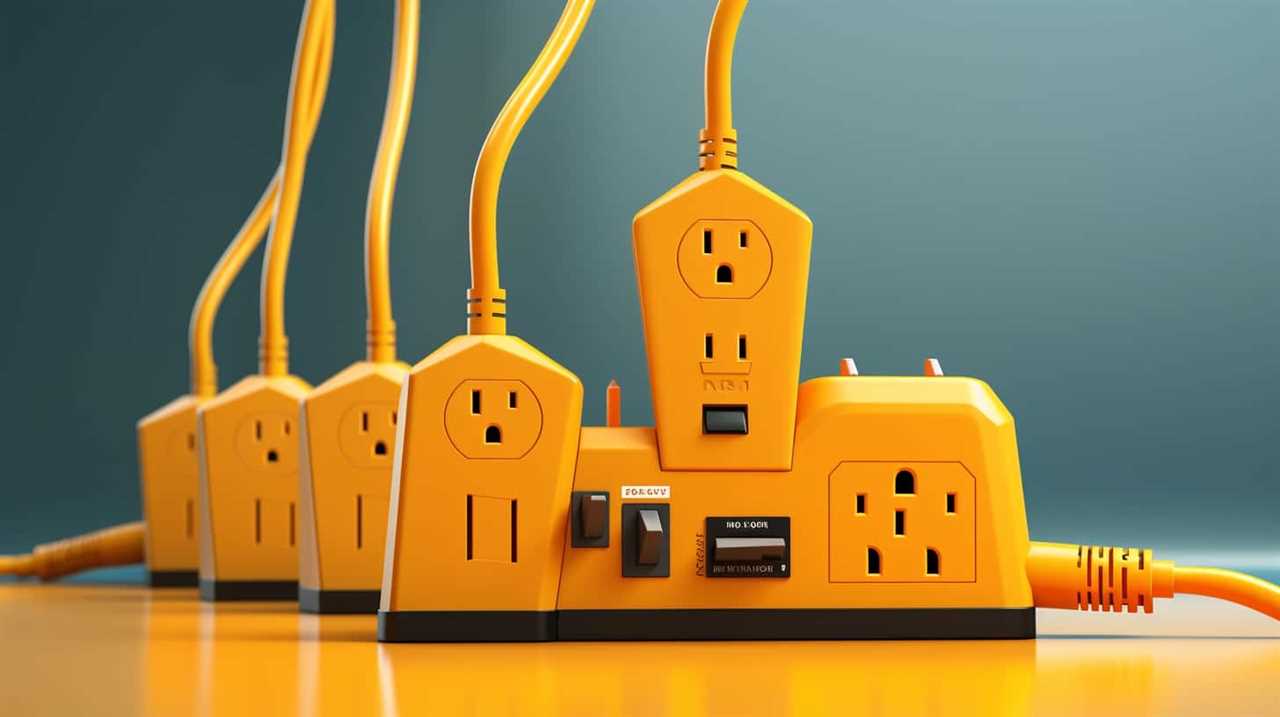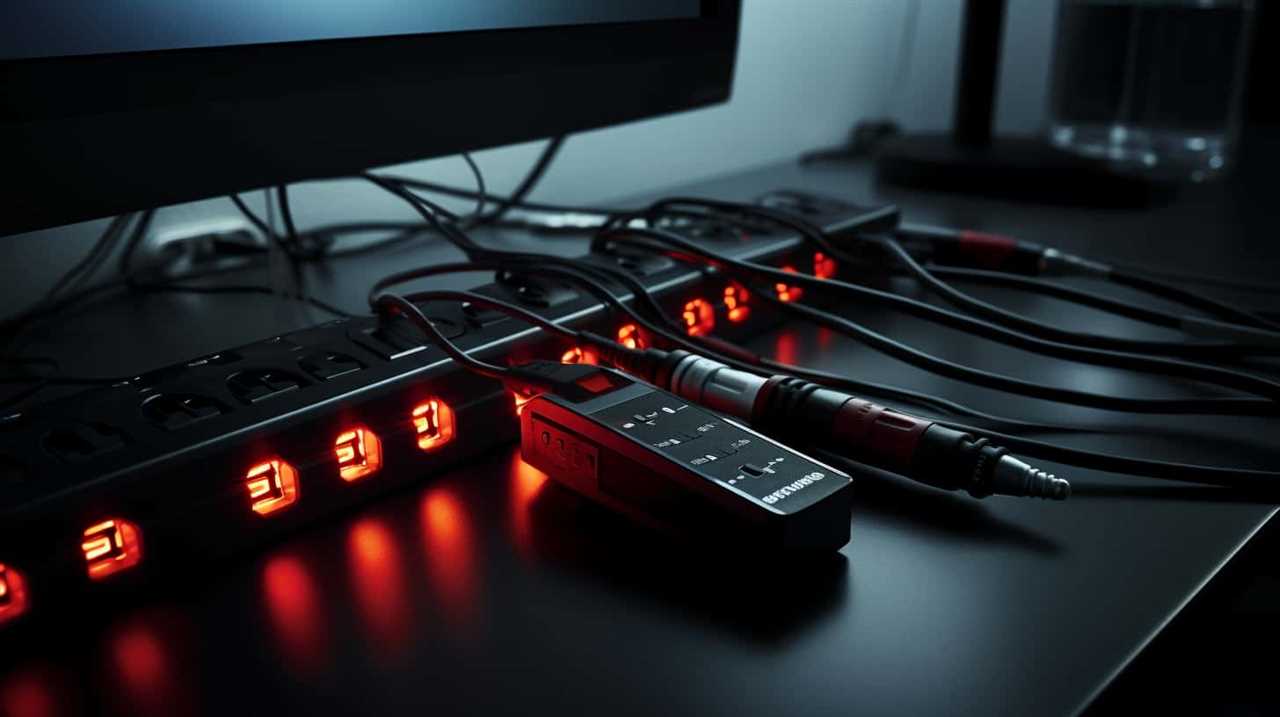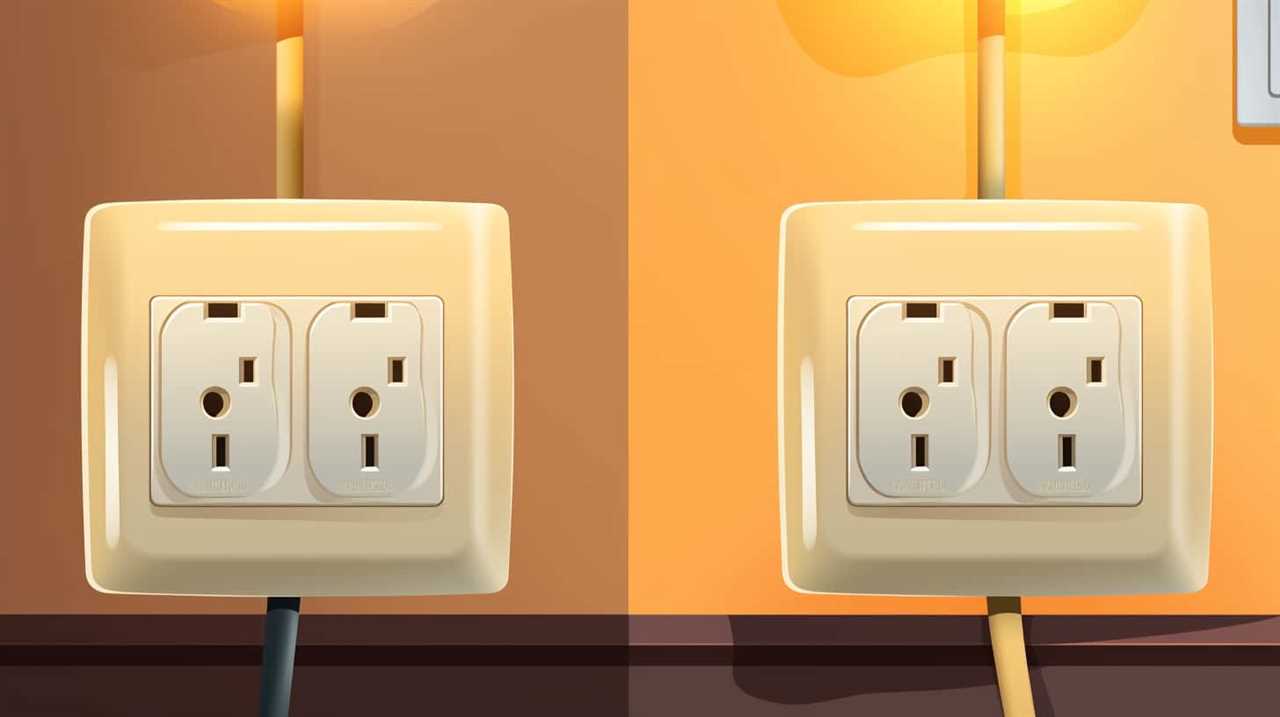In today’s society, where energy conservation is crucial, it is important to grasp the concept of saving energy. One simple yet powerful method to decrease electricity usage is by unplugging appliances when they are not being used.
This practice, known as unplugging, helps eliminate standby power consumption, also known as phantom load. By disconnecting appliances from power sources, we can prevent the energy vampires lurking in our homes from needlessly draining electricity.
Not only does unplugging save energy, but it also saves money by reducing electricity bills. Moreover, this simple act contributes to a greener and more sustainable future by minimizing our environmental impact.
In this article, we will explore the benefits of unplugging appliances and how it can be a sustainable habit worth adopting.

Key Takeaways
- Standby power consumption refers to energy consumed by appliances when not in use.
- Unplugging appliances or using power strips with on/off switches can reduce standby power consumption.
- Unplugging appliances can significantly reduce energy consumption and lead to cost savings on electricity bills.
- Reducing standby power helps in conserving natural resources, mitigating climate change, and protecting the environment.
Understanding Standby Power
The understanding of standby power is crucial in comprehending the reasons why unplugging appliances can save energy. Standby power consumption refers to the energy consumed by appliances or devices when they are not actively in use but still plugged into an electrical outlet. This energy consumption, also known as vampire power or phantom load, can account for a significant portion of the overall energy usage in households and businesses.
By unplugging appliances when they are not in use or using energy-saving measures such as power strips with an on/off switch, individuals can effectively reduce standby power consumption and save energy. This simple action can have a substantial impact on energy conservation efforts and contribute to a more sustainable future.
Understanding the hidden energy drain caused by standby power is the first step towards implementing effective energy-saving practices.
The Hidden Energy Drain
To fully understand the impact of standby power consumption on energy usage, it is important to delve into the hidden energy drain caused by appliances and devices. While these devices may appear to be turned off, they often continue to draw power, leading to significant energy wastage. Here are four examples of hidden energy usage and some energy-saving tips to combat them:

- Chargers: Leaving chargers plugged in when not in use can result in a constant energy drain. Unplug them or use power strips with switches to cut off power completely.
- Electronics in standby mode: Devices like TVs, gaming consoles, and DVD players consume power even when on standby. Turn them off completely or use smart power strips to reduce standby power usage.
- Phantom loads: Certain appliances, such as coffee makers, microwaves, and stereos, consume energy even when not actively in use. Unplug them or use timers to minimize energy wastage.
- Vampire power: Appliances with standby lights, digital displays, or remote control features, like cable boxes and computers, continue to draw power. Use smart power strips or unplug them to eliminate vampire power.
Understanding these hidden energy drains and implementing these energy-saving tips can help reduce your overall energy consumption and lower your electricity bills.
Now, let’s explore the concept of ‘energy vampires at home’ and how they contribute to energy wastage.
Energy Vampires at Home
Energy vampires at home can significantly contribute to energy wastage and increased electricity bills. These energy vampires are appliances and devices that continue to consume power even when they are not in use or on standby mode. Common culprits include televisions, computers, game consoles, and chargers. These devices may seem innocuous, but they can account for up to 10% of a household’s energy consumption.
Fortunately, smart home technology provides solutions to combat these energy vampires. By utilizing smart power strips, for example, users can easily control and monitor power usage, ensuring that energy is not wasted unnecessarily. Additionally, implementing energy-saving tips such as adjusting power settings, enabling sleep mode, and unplugging devices when not in use can further reduce energy consumption.

Transitioning into the subsequent section about ‘unplugging for energy efficiency’, understanding the impact of energy vampires at home highlights the importance of taking proactive measures to unplug appliances and devices for optimal energy efficiency.
Unplugging for Energy Efficiency
Unplugging appliances is a simple yet effective way to maximize energy efficiency and reduce unnecessary power consumption in the home. Here are four energy saving tips to help you reduce electricity consumption:
- Unplug idle electronics: Many devices continue to draw power even when turned off or in standby mode. By unplugging them when not in use, you can eliminate this ‘phantom’ energy usage.
- Use power strips: Plug multiple devices into a power strip and switch it off when not in use. This prevents them from consuming standby power and makes it easier to turn off multiple appliances at once.
- Opt for energy-efficient appliances: When buying new appliances, look for energy star-rated models. They use less energy and can significantly reduce your electricity consumption.
- Utilize natural light: Open curtains and blinds during the day to let natural light in. This reduces the need for artificial lighting and lowers your energy usage.
By implementing these energy saving tips and unplugging appliances, you can not only reduce your electricity consumption but also save money on your energy bills.
In the next section, we will explore how unplugging appliances can lead to significant cost savings.

Saving Money With Unplugged Appliances
Unplugging appliances when they are not in use not only saves energy but also helps save money on utility bills.
By reducing standby power consumption, households can significantly lower their electricity costs over time.
Studies have shown that standby power can account for up to 10% of a home’s energy usage, so unplugging appliances can be a cost-effective way to conserve energy and reduce expenses.
Energy-Saving Benefits Explained
With appliances left unplugged, households can experience significant savings in their energy consumption and subsequent expenses. Understanding energy consumption and implementing tips for energy conservation can greatly contribute to these energy-saving benefits. Here are four key reasons why unplugging appliances leads to cost savings:

- Standby power: Many appliances consume energy even when not in use, known as standby power. Unplugging these appliances eliminates this wasted energy.
- Vampire load: Certain devices, such as phone chargers and gaming consoles, continue to draw power even when not actively charging or being used. Unplugging them prevents this vampire load.
- Phantom power: Electronics with standby features, like TVs and microwaves, consume power to maintain settings or display clocks. Unplugging them stops the flow of phantom power.
- Safety and durability: Unplugging appliances when not in use can prevent electrical fires and extend the lifespan of the devices.
By understanding and implementing these energy conservation tips, households can significantly reduce their energy consumption and save money on their monthly expenses.
Transitioning into the subsequent section about ‘cost-effective appliance conservation’, it is important to explore additional strategies for maximizing energy savings and minimizing expenses.
Cost-Effective Appliance Conservation
To maximize cost savings and energy efficiency, households can implement cost-effective appliance conservation techniques. By incorporating energy-saving strategies, such as unplugging appliances when not in use, households can not only reduce their energy consumption but also save money in the long term.
Unplugging appliances when they are not in use prevents them from consuming standby power, also known as phantom or vampire power, which can account for up to 10% of a household’s energy usage. This small change can result in significant savings on electricity bills over time.

Additionally, implementing smart power strips or timers can further enhance the efficiency of appliance conservation by automatically cutting off power to devices during specified periods.
Reducing Environmental Impact
Reducing the environmental impact is a crucial consideration when it comes to unplugging appliances. By reducing energy consumption, we can significantly lower our carbon footprint and contribute to a more sustainable future.
Unplugging appliances not only saves energy but also helps to minimize greenhouse gas emissions, leading to a cleaner and healthier environment for all.
Energy-Saving Benefits
Unplugging appliances can significantly contribute to the reduction of environmental impact by saving energy. Here are four energy-saving benefits of unplugging appliances:

- Reduced standby power consumption: Many appliances continue to draw power even when turned off or in standby mode. By unplugging these appliances, you can eliminate this unnecessary energy consumption.
- Lower electricity bills: Unplugging appliances when not in use can lead to substantial energy savings, resulting in lower electricity bills. This simple habit can help you save money while reducing your environmental footprint.
- Extended lifespan of appliances: Constantly keeping appliances plugged in can put unnecessary strain on their components, leading to a shorter lifespan. By unplugging them, you can extend their durability and reduce electronic waste.
- Decreased carbon footprint: The energy saved by unplugging appliances helps to reduce the demand for electricity from power plants, which often rely on fossil fuels. By reducing electricity consumption, you can contribute to lower carbon emissions, helping to mitigate climate change.
Minimizing Carbon Footprint
By minimizing the carbon footprint, individuals can actively contribute to reducing the environmental impact caused by energy consumption. One of the key ways to achieve this is by minimizing waste and adopting sustainable living practices.
Carbon footprint refers to the total amount of greenhouse gases, primarily carbon dioxide, emitted directly or indirectly by an individual, organization, or product. Energy consumption is a significant contributor to carbon emissions, with the burning of fossil fuels being a major source.
By reducing energy usage and adopting energy-efficient practices, such as unplugging appliances when not in use, individuals can lower their carbon footprint. Sustainable living involves making choices that prioritize environmental conservation and minimizing waste, such as opting for renewable energy sources and reducing reliance on single-use plastics.
Protecting Appliances From Power Surges
Appliances can be safeguarded from power surges by regularly using surge protectors. These devices are designed to divert excess voltage away from the appliance, preventing damage and ensuring its longevity.

Here are four reasons why surge protectors are essential for power surge prevention:
- Voltage regulation: Surge protectors monitor the voltage levels and automatically cut off power when a surge is detected, keeping your appliances safe.
- Equipment protection: Surge protectors act as a barrier, shielding your appliances from high voltage spikes caused by lightning strikes or power grid fluctuations.
- Data preservation: Surge protectors not only protect your appliances but also safeguard important data stored in electronic devices, such as computers or servers.
- Cost-effective solution: Investing in surge protectors is a cost-effective approach compared to repairing or replacing damaged appliances.
By using surge protectors, you can ensure the protection of your appliances and prevent potential damage caused by power surges.
Now, let’s transition into the subsequent section about the sustainable habit of unplugging appliances.
Unplugging as a Sustainable Habit
One key sustainable habit to adopt is regularly disconnecting appliances from power sources. This simple action can significantly contribute to sustainable living and mindful consumption. By unplugging appliances when they are not in use, we can reduce the standby power consumption known as vampire power. Vampire power refers to the energy consumed by electronic devices when they are plugged in but not in use. This unnecessary energy usage contributes to greenhouse gas emissions and increases our carbon footprint. To visualize the impact of unplugging appliances, consider the following table:

| Appliances | Average Standby Power (Watts) |
|---|---|
| Television | 5-10 |
| Computer | 2-10 |
| Coffee Maker | 1-5 |
| Game Console | 1-5 |
Frequently Asked Questions
How Much Standby Power Do Appliances Typically Consume When Left Plugged In?
The standby power consumption of common household appliances varies, but on average, they can consume around 5-10 watts of power when left plugged in. To minimize standby power usage, strategies such as using power strips or smart plugs can be employed.
Do Appliances Continue to Consume Standby Power Even When Turned Off?
Standby power consumption in appliances, even when turned off, can have a significant impact on overall energy consumption. Implementing strategies to minimize standby power usage, such as unplugging appliances when not in use, can help save energy.
Can Unplugging Appliances Actually Help Reduce My Electricity Bill?
Unplugging appliances can indeed help reduce electricity bills, as it prevents standby power consumption. Additionally, adopting energy-efficient practices such as using LED bulbs, optimizing heating and cooling settings, and investing in energy-saving appliances can further reduce electricity usage and have a positive impact on environmental sustainability.
How Much Energy Can Be Saved by Unplugging Appliances on a Daily Basis?
Unplugging appliances on a daily basis can have a significant environmental impact, reducing energy consumption and lowering greenhouse gas emissions. This simple action promotes energy conservation and contributes to a more sustainable future.

Are Certain Appliances More Prone to Consuming Standby Power Than Others?
Certain appliances are more prone to consuming standby power than others due to differences in their efficiency and power-saving features. Understanding these trends can help consumers make informed decisions about energy usage and reduce unnecessary standby power consumption.
Conclusion
In conclusion, unplugging appliances can save significant amounts of energy and money. By eliminating standby power and reducing the use of energy vampires, we can reduce our environmental impact and protect our appliances from power surges.
Unplugging appliances also serves as a sustainable habit that promotes energy efficiency. For instance, did you know that leaving a fully charged laptop plugged in wastes as much energy as leaving a 100-watt light bulb on for nine days? By simply unplugging our devices when not in use, we can make a positive impact on our energy consumption.









